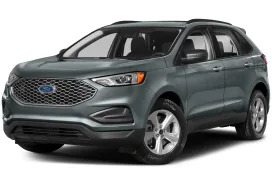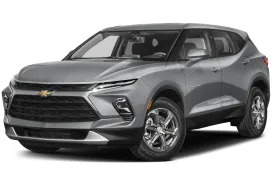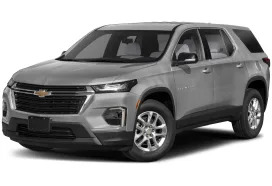The 2012 Ford Edge is set to be available with four-cylinder EcoBoost power with the addition of a turbocharged 2.0-liter engine, and reports are emerging that the vehicle will be able to return some fairly impressive fuel economy numbers. According to Ford Inside News, the Environmental Protection Agency has concluded testing, and the Edge 2.0 EcoBoost has managed to eek out 30 mpg highway. That's three miles per gallon better than the comparable 3.5-liter V6-equipped 2011 model and two miles per gallon better than the Explorer 2.0-liter EcoBoost, whose 28 mpg highway figure was just made official last week.
Ford Inside News also reports that the engine will continue to turn out 240 horsepower and 275 pound-feet of torque when tucked into the Edge. While we're betting that while our right foot will likely miss the extra 45 horsepower produced by the 3.5-liter V6, the extra 22 pound-feet of torque mustered up by the forced-induction four-cylinder should help make up the gap. Our wallets probably won't mind skipping the gas station a little more often, too.
UPDATE: Ford has confirmed the 2012 Edge EcoBoost's 30 mpg fuel economy rating in the official press release after the jump.
Ford Inside News also reports that the engine will continue to turn out 240 horsepower and 275 pound-feet of torque when tucked into the Edge. While we're betting that while our right foot will likely miss the extra 45 horsepower produced by the 3.5-liter V6, the extra 22 pound-feet of torque mustered up by the forced-induction four-cylinder should help make up the gap. Our wallets probably won't mind skipping the gas station a little more often, too.
UPDATE: Ford has confirmed the 2012 Edge EcoBoost's 30 mpg fuel economy rating in the official press release after the jump.
Ford Edge with New EcoBoost 2.0L Engine Delivers EPA-Rated 30 MPG Highway, Great Performance
* The popular Ford Edge crossover with EcoBoost® power is EPA-rated at an economical 30 mpg highway and 21 mpg city
* Ford Edge with EcoBoost is now the 13th Ford model/powertrain combination to deliver an EPA fuel economy rating of 30 mpg or more
* EcoBoost, combining smaller engines and turbocharging, is a global Ford engine technology that gives customers the power they want and the fuel efficiency they need
* EcoBoost vehicles have been successful at attracting new customers to the Blue Oval brand, leading the Ford product portfolio in conquest sales
Dearborn, Mich., Aug. 2, 2011 – The Ford Edge crossover, the latest vehicle to receive the company's EcoBoost® 2.0-liter four-cylinder engine, is now certified by the EPA to deliver 30 mpg highway. This complements the best-in-class Edge V6 fuel economy to give utility customers expanded fuel efficient choices.
"Fuel efficiency is important to our customers," said Amy Marentic, group marketing manager, Large Cars and Crossovers. "Adding the EcoBoost engine to the new Ford Edge crossover makes for 13 vehicles delivering 30 mpg or more in the Ford showroom."
The Ford Edge delivers 30 mpg on the highway, besting all SUVs its size or larger, in addition to cars such as the Honda Civic Si and the Saab 9-3 automatic. The only competitive utilities offering higher highway fuel economy than Edge with EcoBoost are a few smaller-size vehicles such as the Ford Escape Hybrid.
Combining gasoline direct injection and turbocharging with smaller overall displacement, this advanced new EcoBoost engine delivers the power of a normally aspirated V6, yet delivers four-cylinder fuel efficiency.
EcoBoost has been successful at attracting new, more upscale customers to the Ford showroom. Taurus SHO and Flex with EcoBoost lead the Ford lineup for car and utility conquesting. More than half of all Taurus SHO buyers are new to the Ford brand, and more than 62 percent of Flex with EcoBoost buyers had not previously considered a Ford product.
With popular F-150 pickup trucks now offering an EcoBoost option, sales of Ford vehicles with this advanced technology have crested 70,000 units and the F-150 EcoBoost now accounts for 41 percent of total F-150 sales, making it the top-selling full-sized V6 pickup truck on the market.
EcoBoost is a global Ford engine to provide affordable fuel efficiency for millions of drivers, while delivering the power they desire. By the end of 2011, Ford will have built nearly 180,000 EcoBoost-powered vehicles in North America. EcoBoost will be offered in 90 percent of Ford vehicles by 2013. Ford holds more than 125 patents on its EcoBoost engine technology.
13 at 30 or more
Adding a fuel-efficient EcoBoost engine to the popular Edge crossover means the Ford showroom now offers customers a choice among 13 model/powertrain variations that deliver an EPA fuel economy rating of 30 mpg or more.
These Ford offerings are listed here with their respective city/highway EPA-rated fuel economy estimates:
* Edge with EcoBoost: 21 mpg/30 mpg
* Escape Hybrid FWD: 34 mpg/31 mpg
* Escape Hybrid AWD: 30 mpg/27 mpg
* Fiesta five-speed manual: 29 mpg/37 mpg
* Fiesta automatic: 29 mpg/38 mpg
* Fiesta SFE automatic: 29 mpg/40 mpg
* Focus five-speed manual: 29 mpg/37 mpg
* Focus automatic: 28 mpg/38 mpg
* Focus SFE automatic: 28 mpg/40 mpg
* Fusion 2.5-liter automatic: 23 mpg/33 mpg
* Fusion Hybrid: 41 mpg/36 mpg
* Mustang 3.7-liter Coupe automatic: 19 mpg/31 mpg
* Mustang 3.7-liter Convertible automatic: 19 mpg/30 mpg
Edge fuel-saving technologies
Building on Edge V6 best-in-class highway fuel economy, the EcoBoost powertrain makes Edge an even more economical proposition.
This advanced EcoBoost four-cylinder engine provides the optimum balance between fuel efficiency and responsive power, delivering 240 horsepower at 5,500 rpm and a generous 270 lb.-ft. of torque at 3,000 rpm. Edge with EcoBoost delivers comparable fuel economy to Chevrolet Equinox and GMC Terrain, yet offers utility shoppers a responsive choice as Edge provides a 58 horsepower advantage over these compact General Motors offerings.
The Edge with EcoBoost combination of superior fuel efficiency and ample responsiveness is enabled by direct gasoline injection and twin independent variable camshaft timing (Ti-VCT).
Efficiency is further enhanced through employment of low-friction 5W-GF5 motor oil, a variable-displacement air conditioning compressor and a unique 6F35 six-speed automatic transmission optimized for fuel efficiency through employment of active transmission warm-up to help reduce internal friction as the powertrain approaches normal operating temperature.
Edge with EcoBoost also introduces category-exclusive active grille shutters. These variable grille slats close as vehicle speed increases to improve aerodynamics and fuel efficiency.
* The popular Ford Edge crossover with EcoBoost® power is EPA-rated at an economical 30 mpg highway and 21 mpg city
* Ford Edge with EcoBoost is now the 13th Ford model/powertrain combination to deliver an EPA fuel economy rating of 30 mpg or more
* EcoBoost, combining smaller engines and turbocharging, is a global Ford engine technology that gives customers the power they want and the fuel efficiency they need
* EcoBoost vehicles have been successful at attracting new customers to the Blue Oval brand, leading the Ford product portfolio in conquest sales
Dearborn, Mich., Aug. 2, 2011 – The Ford Edge crossover, the latest vehicle to receive the company's EcoBoost® 2.0-liter four-cylinder engine, is now certified by the EPA to deliver 30 mpg highway. This complements the best-in-class Edge V6 fuel economy to give utility customers expanded fuel efficient choices.
"Fuel efficiency is important to our customers," said Amy Marentic, group marketing manager, Large Cars and Crossovers. "Adding the EcoBoost engine to the new Ford Edge crossover makes for 13 vehicles delivering 30 mpg or more in the Ford showroom."
The Ford Edge delivers 30 mpg on the highway, besting all SUVs its size or larger, in addition to cars such as the Honda Civic Si and the Saab 9-3 automatic. The only competitive utilities offering higher highway fuel economy than Edge with EcoBoost are a few smaller-size vehicles such as the Ford Escape Hybrid.
Combining gasoline direct injection and turbocharging with smaller overall displacement, this advanced new EcoBoost engine delivers the power of a normally aspirated V6, yet delivers four-cylinder fuel efficiency.
EcoBoost has been successful at attracting new, more upscale customers to the Ford showroom. Taurus SHO and Flex with EcoBoost lead the Ford lineup for car and utility conquesting. More than half of all Taurus SHO buyers are new to the Ford brand, and more than 62 percent of Flex with EcoBoost buyers had not previously considered a Ford product.
With popular F-150 pickup trucks now offering an EcoBoost option, sales of Ford vehicles with this advanced technology have crested 70,000 units and the F-150 EcoBoost now accounts for 41 percent of total F-150 sales, making it the top-selling full-sized V6 pickup truck on the market.
EcoBoost is a global Ford engine to provide affordable fuel efficiency for millions of drivers, while delivering the power they desire. By the end of 2011, Ford will have built nearly 180,000 EcoBoost-powered vehicles in North America. EcoBoost will be offered in 90 percent of Ford vehicles by 2013. Ford holds more than 125 patents on its EcoBoost engine technology.
13 at 30 or more
Adding a fuel-efficient EcoBoost engine to the popular Edge crossover means the Ford showroom now offers customers a choice among 13 model/powertrain variations that deliver an EPA fuel economy rating of 30 mpg or more.
These Ford offerings are listed here with their respective city/highway EPA-rated fuel economy estimates:
* Edge with EcoBoost: 21 mpg/30 mpg
* Escape Hybrid FWD: 34 mpg/31 mpg
* Escape Hybrid AWD: 30 mpg/27 mpg
* Fiesta five-speed manual: 29 mpg/37 mpg
* Fiesta automatic: 29 mpg/38 mpg
* Fiesta SFE automatic: 29 mpg/40 mpg
* Focus five-speed manual: 29 mpg/37 mpg
* Focus automatic: 28 mpg/38 mpg
* Focus SFE automatic: 28 mpg/40 mpg
* Fusion 2.5-liter automatic: 23 mpg/33 mpg
* Fusion Hybrid: 41 mpg/36 mpg
* Mustang 3.7-liter Coupe automatic: 19 mpg/31 mpg
* Mustang 3.7-liter Convertible automatic: 19 mpg/30 mpg
Edge fuel-saving technologies
Building on Edge V6 best-in-class highway fuel economy, the EcoBoost powertrain makes Edge an even more economical proposition.
This advanced EcoBoost four-cylinder engine provides the optimum balance between fuel efficiency and responsive power, delivering 240 horsepower at 5,500 rpm and a generous 270 lb.-ft. of torque at 3,000 rpm. Edge with EcoBoost delivers comparable fuel economy to Chevrolet Equinox and GMC Terrain, yet offers utility shoppers a responsive choice as Edge provides a 58 horsepower advantage over these compact General Motors offerings.
The Edge with EcoBoost combination of superior fuel efficiency and ample responsiveness is enabled by direct gasoline injection and twin independent variable camshaft timing (Ti-VCT).
Efficiency is further enhanced through employment of low-friction 5W-GF5 motor oil, a variable-displacement air conditioning compressor and a unique 6F35 six-speed automatic transmission optimized for fuel efficiency through employment of active transmission warm-up to help reduce internal friction as the powertrain approaches normal operating temperature.
Edge with EcoBoost also introduces category-exclusive active grille shutters. These variable grille slats close as vehicle speed increases to improve aerodynamics and fuel efficiency.













Sign in to post
Please sign in to leave a comment.
Continue